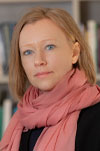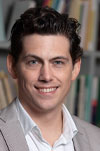Former Contributors to the Project

Jenny Andersson, Research Professor
Jenny Andersson’s work in Global Foresight encompasses the rise of
future consultancy activity
from the 1970s onwards, analyzing the
competing institutes and tools developed by futurists and
their impact
on global development and business advice. She draws upon the sociology
of expertise
and studies on global communities of experts to explain this
phenomenon. Through her interdisciplinary research group, she seeks
to deepen our understanding of future governance and expertise
in shaping our world.
Jenny Andersson is an economic historian and CNRS Research Professor at the Center for Euro-
pean
Studies (CEE) in Paris and Professor at the Department of History of Science and Ideas at
Uppsala
University. Andersson’s research focuses on the institutionalization of future governance
and the
transnational history of futurists and their visions of the world. She conducts archival
research and
oral history interviews to trace the development of futures studies and the construc-
tion of institutions
for future governance.

Peter Mancina, Researcher
Dr. Peter Mancina is a cultural and political anthropologist who studies
governmental power, policing, immigration control, everyday policy
implementation, and social movement organizing. He is a visiting scholar
at Rutgers Law School Center for Immigration Law, Policy, and Justice,
and research associate at the University of Oxford Centre for Criminology
and Border Criminologies program. His work has examined the manner
in which ‘sanctuary city’ and ‘sanctuary state’ policies in the United States operationalize, moralize,
and normalize local law enforcement protocols for assisting immigration enforcement authorities in
deporting individuals convicted of crimes. He holds a Ph.D. in Anthropology from Vanderbilt Univer-
sity, and his work has been funded by the United States National Science Foundation, the Wenner-
Gren Foundation, the Swedish Collegium for Advanced Study, and the Rutgers Law School Pratt
Fund. In addition to his academic work, Dr. Mancina serves as a consultant for non-profit organiz-
ations, local government policy-makers, and universities, and he has helped draft sanctuary city
laws in San Francisco and for the region’s Bay Area Rapid Transit Authority. Dr. Mancina is writing
a book titled Governing Mobility: Sanctuary City and the Future of Municipal Government examining
three decades of local experimentation with implementing sanctuary city policies in San Francisco,
California.

Anette Nyqvist, Associate Professor
Anette Nyqvist’s research within Global Foresight focuses on global
economic forecasting and scenario making. Her study aims to under-
stand
the professionals, practices, and ideas involved in these processes.
Through ethnographic fieldwork, including participant observation and
qualitative interviews, among a team of economic forecasters at a reputable
organization with significant influence in global economic forecasts,
her project seeks to explore the main actors, tools, models, and assumptions used by economic
forecasters and scenario makers, as well as the knowledge generated and how it is presented and
disseminated.
Anette Nyqvist was Associate Professor of Social Anthropology at Stockholm University. Her
research interests lied in the intersection of statecraft and market-making. She has made notable
contributions to the anthropology of organizations and the anthropology of policy through publi-
cations such as Ombudskapitalisterna: Institutionella ägares röst och roll (Liber, 2015), Organi-
sational Anthropology: Doing Ethnography in and Among Complex Organizations (co-authored
with Professor Christina Garsten, Pluto Press, 2013), and Reform and Responsibility in the Re-
making of the Swedish National Pension System: Opening the Orange Envelope (Palgrave Mac-
millan, 2016). She was also involved in a research project funded by the Swedish Research Council,
examining the responsible investment practices of major American pension funds.
Anette Nyqvist passed away in July 2021. She is deeply missed by the project team and beyond.

Darcy Pan, Associate Researcher
Darcy Pan joined the Department of Social Anthropology at Stockholm
University in 2010 and received her doctorate in December 2016. Entitled
“Laboring through uncertainty: an ethnography of the Chinese state, labor
NGOs,
and development,” Darcy’s PhD dissertation investigates how inter-
national development projects supporting labor activism work in contemporary
China. Foregrounding the notion of uncertainty, Darcy studied how state control
is exercised by examining
a specific logic of practices, discourses, and a mode of existence that
constantly mask and unmask the state.
More specifically, the study explores how uncertainty about
the boundaries of permissible activism is generative of a sociopolitical realm in which variously
positioned subjects mobilize around the idea of the state,
which in turn leads to articulations and
practices conducive to both self-censorship and a contingent space
of activism. Darcy Pan joined
the Global Foresight project in September 2016.

Sébastien Picard, Associate Professor
This project aims to enhance global governance by recognizing and under-
standing the political role of corporations in contemporary society. With
increasing social expectations and accountability, especially in strategic
industries, it is crucial to manage corporate political activities. The research
explores how corporations have established corporate capitalism as a modern
framework for social
order and governance. The main question addressed is
how anticipatory
knowledge
associated with corporate capitalism has enabled multinational corpo-
rations to assume social
functions traditionally performed by the state while securing commercial
success. Through ethnographic techniques and a focus on corporate political activities in Asian
institutional contexts, the
study delves into the creation of anticipatory knowledge, providing insights
into professionals’ motivations, priorities, and aspirations. By unraveling the process of corporate
politicization, it contributes
to a deeper understanding of this phenomenon. In his role as Assistant
Professor of Strategy at the
Toulouse School of Management, Picard’s expertise in strategy dynamics
and corporate political
activities of multinational corporations in emerging economies, has contributed
to the Global Foresight research programme.
Photo credits: Danish Saroee (Andersson);
Johan Wahlgren (Mancina)
